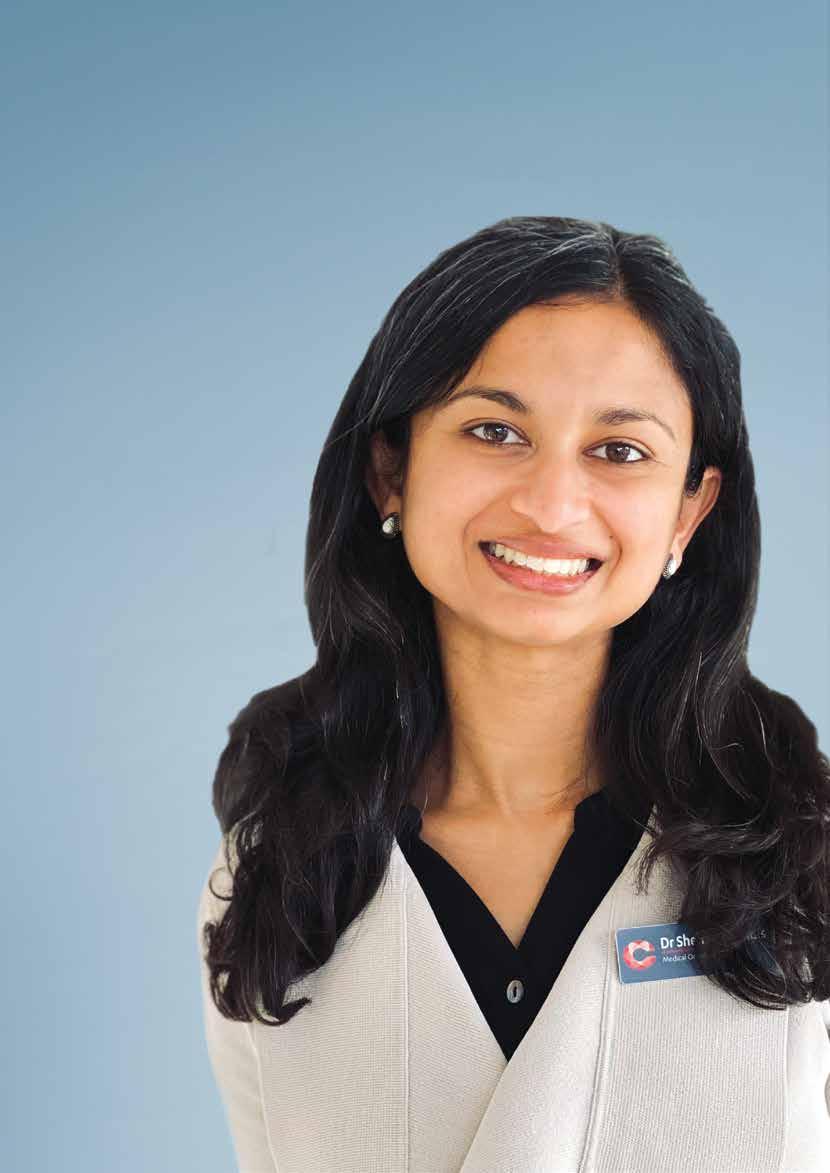
3 minute read
In the spotlight: Dr Shehara Mendis
Dr Shehara Mendis
MEDICAL ONCOLOGIST AND RESEARCHER, CABRINI MONASH UNIVERSITY DEPARTMENT OF MEDICAL ONCOLOGY
Dr Shehara Mendis is an early-career medical oncologist. She joined the Cabrini Monash University Department of Medical Oncology in the midst of Melbourne’s longest lockdown last year. While this naturally provided a challenge, Shehara was fortunate to be returning to some familiar territory, having been a registrar at Cabrini in 2016. In the intervening years she had completed a clinical fellowship at Western Health and spent 18 months in Vancouver, Canada undertaking a clinical and research fellowship at BC Cancer.
Shehara says her Canadian fellowship provided a wonderful opportunity to work with some of Canada’s leading gastrointestinal medical oncologists, as well as gain exposure to a different healthcare system and expand her research capabilities, in no small part due to BC Cancer’s translational research program. Some of the research output arising from her Canadian experience included a deep dive into the small minority of metastatic colorectal cancer patients that harbour an atypical BRAF mutation. Another project she led was one demonstrating that trial enrolment by sex remains an area of ongoing disparity, with under-enrolment of women, especially in solid organ cancers. This is of particular relevance to Shehara as a medical oncologist who actively enrols patients on trials. Understanding the mechanisms behind this will be key to removing the inequity.
While in Vancouver, Shehara also commenced a Master of Cancer Sciences through the University of Melbourne that was run wholly online. She greatly enjoyed the postgraduate degree and highly recommends it to anyone considering post-graduate study in oncology who needs flexibility in how they complete the course. Shehara started the degree while still in Vancouver, and completed it while navigating a return to Australia and taking on a number of new roles. Despite so much going on she did exceptionally well, and was proudly the dux of her cohort and received the prize for best monograph (research project) on graduation earlier this year. The manuscript arising from her Masters is under review at present and she hopes to be able to share the outcomes of the study shortly.
Here at Cabrini, Shehara says she has been fortunate to be linked in with very established researchers in the Cabrini Monash University Department of Surgery, and involved in a number of research projects they are running. One project, working with Dr Rebekah Engel, looks to expand the department’s organoid study to include patients with colorectal cancer who have already received treatment for their cancer. Ultimately they hope to be able to use organoids to inform the direction of future treatments for these patients.
As a young investigator, Shehara hopes to build the gastrointestinal trials portfolio under the tutelage of fantastic oncologists and leaders in this area. She credits Professor Gary Richardson OAM, Associate Professor Jeremy Shapiro and Associate Professor Lara Lipton for providing enormous mentorship. As a member of the Australasian Gastro-Intestinal Trials Group (AGITG) Upper Gastro-Intestinal Working Party, Shehara hopes to be able to bring some investigator-initiated trials into this space. Shehara has also been leading the build of the Cabrini Upper Gastrointestinal Registry (CAPSTONE), working with Data Manager Sharon Guo. CAPSTONE will capture the care and outcomes of patients with upper gastrointestinal cancer treated at Cabrini, to ensure Cabrini refines patient care as appropriate in the future.
Shehara is incredibly grateful for the opportunities she has been given at Cabrini. She says: “It’s incredible to be involved in so many moving parts and to work with so many wonderful researchers.”









